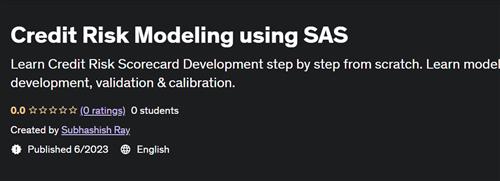Credit Risk Modeling using SAS

Free Download Credit Risk Modeling using SAS
Published 6/2023
Created by Subhashish Ray
MP4 | Video: h264, 1280x720 | Audio: AAC, 44.1 KHz, 2 Ch
Genre: eLearning | Language: English | Duration: 26 Lectures ( 3h 50m ) | Size: 1.64 GB
Learn Credit Risk Scorecard Development step by step from scratch. Learn model development, validation & calibration.
What you'll learn
Learn model development and validation
Understand SAS programming steps
Understand SAS programming output interpretation
Learn the process flow in model development, validation and calibration step by step from scratch
Understand the science and logic behind model development
Learn data preparation in depth
Requirements
Basic Knowledge of SAS
Zeal and enthusiasm for learning a new skill
Computer with internet connection
SAS Studio
Description
Credit Risk Modeling is a technique used by lenders to determine the level of credit risk associated with extending credit to a borrower. In other words, it's a tool to understand the credit risk of a borrower. This is especially important because this credit risk profile keeps changing with time and circumstances. Credit risk modeling is the process of using statistical techniques and machine learning to assess this risk. The models use past data and various other factors to predict the probability of default and inform credit decisions.This course teaches you how banks use statistical modeling in SAS to prepare credit risk scorecard which will assist them to predict the likelihood of default of a customer. We will deep dive into the entire model building process which includes data preparation, scorecard development and checking for a robust model, model validation and checking for the accuracy of the model step by step from scratch. This course covers the following in detail with output interpretation, best practices and SAS Codes explanations :1) Understanding the dataset and the key variables used for scorecard building2) Development sample exclusions3) Observation and Performance window4) Model Design Parameters5) Vintage and Roll Rate Analysis6) Data Preparation which includes missing values and outlier identification and treatment7) Bifurcating Training and Test datasets 8) Understanding the dataset in terms of key variables and data structure9) Fine and Coarse classing10) Information value and WOE11) Multicollinearity 12) Logistic Regression Model development with statistical interpretation13) Concordance, Discordance, Somer's D and C Statistics14) Rank Ordering, KS Statistics and Gini Coefficient15) Checking for Clustering16) Goodness of fit test17) Model Validation and18) Brier Score for model accuracy
Who this course is for
Students
Risk Analytics Professionals
Statisticians
Experienced Risk Modelers
For Someone who wish to start/shift their career towards risk modeling
Homepage
https://www.udemy.com/course/credit-risk-modeling-using-sas/Links are Interchangeable - Single Extraction
